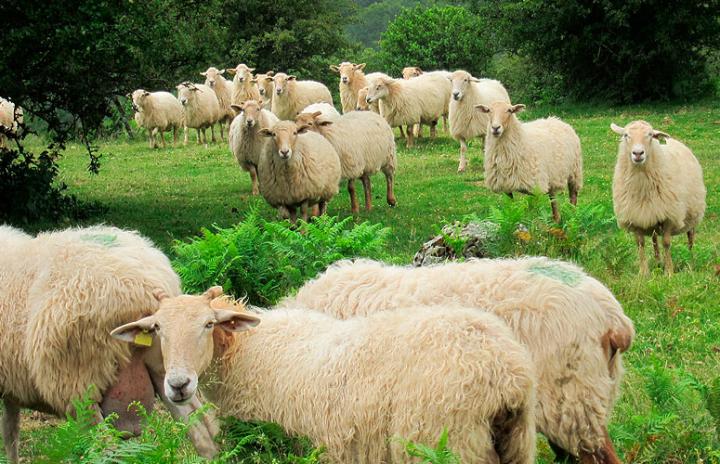The Lactiker research group at the University of the Basque Country (UPV/EHU) is working from a range of different perspectives to improve the yield of Idiazabal cheese and the technologies used in its production

Credit: Lactiker / UPV/EHU
The multidisciplinary research group Lactiker – Quality and Safety of Foods from Animal Origin, which is attached to the University of the Basque Country (UPV/EHU), is working on (among other things) characterising the biochemical, microbiological and technological processes involved in cheese manufacturing that have a direct impact on its technological, nutritional and sensory quality, as well as on its food safety status. The aim is to provide the cheesemaking industry with the information it requires to ensure safe, high-quality products.
The group, which has been working in this field for 25 years, has conducted studies focusing on all aspects of the production of cheeses under the Idiazabal Protected Designation of Origin label: ‘For years we have researched how fermentation occurs; how to enable clotting using natural or commercial rennets; how cheese matures; why raw milk is used and what difference using pasteurised milk would make,’ explains Luis Javier R. Barron, lead researcher from the Lactiker group. Another of the group’s principal scientific contributions is ‘the determination, characterisation and parametrisation of the sensory properties of Idiazabal cheese, so that it can be identified as such,’ he continues. To this end, the team works in collaboration with the UPV/EHU’s Sensory Laboratory (LASEHU), which is authorised to carry out sensory quality controls for Idiazabal cheese. At the laboratory they analyse ‘whether cheeses comply with the sensory requirements of Idiazabal. There are sensory differences between cheeses, which is indicative of the fact that producers make cheeses with a variety of different nuances in terms of aroma, taste and texture; these nuances are highly valued by consumers,’ he adds.
The importance of transferring knowledge
The group works shoulder to shoulder with small artisan dairies producing Idiazabal cheese, ‘in which the role of the cheesemaker is crucial, because while the parameters of the production process are regulated, they are not automated. The cheeses produced in these small dairies are almost signature products. For example, we have observed the way in which they induce clotting, studying clotting times, the amount of rennet used, the type of cutting applied, the whey draining process, etc. All these are essential processes in cheesemaking, but they depend greatly on the cheesemakers,’ explains the professor from the UPV/EHU.
In a recent study, they analysed the relationships between cheese-processing conditions and curd and cheese properties, with the aim of improving yield while maintaining the high quality of the product. According to Prof. Barron, the results obtained ‘may help establish specific guidelines for clotting and whey draining processes, which in turn may help improve the production process of artisanal Idiazabal cheese’. Another recent study carried out by Lactiker aimed to analyse the extent to which environmental or technological conditions affect the sensory differentiation of raw ewe milk cheeses produced in valley or mountain farms.
In addition to working with small artisan dairies, the Lactiker group also collaborates with the official Protected Designation of Origin, as well as with producers’ associations such as Artzai-Gazta. As a result of the doctoral thesis carried out by Ane Aldalur, the group has published and distributed a short leaflet targeted at small dairies and containing a series of recommendations for small-scale producers: ‘We aim to help dairies control their production processes better. We learn from the cheesemakers, and they from us. They have experience making cheese and we analyse the reasons behind certain things, identify possible improvements and come up with solutions to certain problems,’ explains the group’s lead researcher.
For some years now, the Lactiker group has been pursuing an avenue of research which aims to assess the sustainability of food production systems, particularly those based on grazing. This project, which is carried out in collaboration with other research groups, aims to ‘find ways of assessing the sustainability of systems based on grazing, which itself depends on economic and environmental factors, food quality and safety and social and cultural issues, among others. We need to determine whether, in the medium and long term, these systems are sustainable in the globalised world in which we now live. Providing they are sustainable, these small dairies can and should defend their livelihoods. We need to send this message out to the general public.
We are eager to see how we can support small-scale producers who keep their own flocks of grazing animals, such as Latxa sheep. There are many problems and difficulties to be overcome, but one of the most significant, which can be found in many different areas of Europe and other Mediterranean countries, is the gradual decline of grazing systems. If we start to use milk that does not come from grazing sheep, then Idiazabal cheese will no longer have the characteristics and properties it has at the moment, and we will gradually lose the benefits provided by the grazing system in terms of the environment, biodiversity, culture and rural development,’ he concludes.
###
Media Contact
Matxalen Sotillo
[email protected]
Original Source
https:/
Related Journal Article
http://dx.




